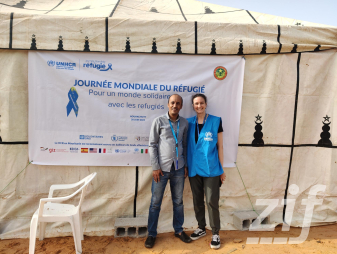Anna-Katharina Reiser
Associate Community-Based Protection Officer
UNHCR Mauritania
Operating period: January – August 2025
What were your responsibilities?
The aim of our work was to strengthen the community-centred approach and thus also accountability to the affected population groups. So it was always about good communication and transparency. Specifically, I mainly developed feedback and complaint mechanisms and supported, for example, the introduction and further development of the new nationwide UNHCR hotline.
I regularly coached the hotline staff, systematised referral mechanisms to appropriate support services and provided information about the hotline service in refugee communities. Together with UNHCR colleagues, we also designed the website HELP.unhcr.org/Mauritania, which provides important information on the asylum procedure and support services for refugees.
Another of my projects was the expansion of the Community Outreach Volunteer Programme in the urban areas of Nouakchott and Nouadhibou. I also continued to build up the nationwide Community Protection Network, which comprises members from 40 organisations. In all of this, I always worked closely with colleagues from the Protection Units in all UNHCR offices in Mauritania, implementing partner organisations, especially CIAUD Canada, and refugee communities.
What sticks in your mind?
The discussions with focus groups and the direct exchange with refugees, especially with people with disabilities in Nouakchott. Their enormous resilience, creativity and willingness to help others despite extremely difficult living conditions and challenges touched me deeply.
I will also have fond memories of the tremendous commitment of the staff who provide direct advice to refugees at the protection desks and via the hotline and refer them to support services.
How and in what ways were you able to ‘make a difference’ on the ground?
In Mauritania, increased measures to control irregular migration have led to a rise in arrests and deportations of migrants, including persons with international protection status and asylum seekers. This is challenging for those affected and has a direct impact on UNHCR's community-centred protection work: the freedom of movement and scope of action of community outreach volunteers is significantly restricted by increased controls and uncertainty. In this context, the UNHCR hotline, which I worked on, has established itself as a central communication channel. It enables refugees to report arrests and impending deportations and to arrange for direct referral to legal partners to enable rapid intervention.
What motivated you to get involved?
I am convinced that a community-centred approach is the most sustainable and effective way to support affected people. In various UNHCR operations, I have seen how much potential there is in working directly with refugee communities when accountability, genuine participation and partnership are taken seriously. Unfortunately, this approach is still not widely implemented in practice. That is precisely why I am committed to community-based protection and want to strengthen and further develop this approach. I firmly believe that genuine protection and sustainable solutions are only possible in collaboration with the people affected.
The photo shows Anna-Katharina Reiser with her UNHCR colleague Ibrahim Abdorahmane at the World Refugee Day event in Nouakchott on 20 June 2025, photographed by Ali Ag Alpha (UNHCR).
